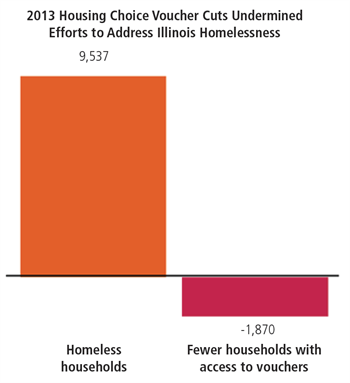
Eric Allix Rogers—Creative Commons
Between falling wages and rising rental costs, Americans across the income spectrum are increasingly being squeezed to cover living costs in integrated, livable, transit-rich neighborhoods.
 By Breann Gala and MPC AmeriCorps VISTA Member Kaitlyn McClain
By Breann Gala and MPC AmeriCorps VISTA Member Kaitlyn McClain - April 16, 2014
The Housing Choice Voucher (HCV) Program is the nation’s largest rental assistance program. It assists families, the homeless, the elderly and the disabled to find affordable, quality homes in neighborhoods that are safe, have good schools and are close to job opportunities. Households are free to choose homes in the private market, allowing families to move as their needs change without losing assistance.
The fact that these rental assistance vouchers allow families to choose homes in the private market also helps the economy. In 2012, landlords in Illinois received $661 million in rental assistance payments. These payments allow owners to make property tax payments and maintain their properties in good condition, preventing community blight.
Research has demonstrated that 72 percent of homeless people require rental, job and housing search assistance as well as other short-term services before returning to secure, stable living environments. Providing rental assistance to these households is critical to preventing chronic homelessness—and, ultimately, it saves taxpayers money by reducing the need for long-term physical and mental health services, social services, case management and substance abuse treatment. According to the Point in Time Count, U.S. Housing and Urban Development, more than 9,500 Illinois households were homeless on a given night; stabilizing this population strengthens Illinois communities and reduces public expenditures.

Unfortunately, the HCV program experienced an unprecedented reduction in federal appropriations in 2013 due to sequestration. While the budget sequester may be officially over, its impacts are far reaching. Nationally, 70,000 fewer households were able to use their rental assistance vouchers at the end of 2013, compared with a year earlier. In Illinois, 1,870 fewer households were able to use their rental assistance vouchers; and if Congress does not restore HCV program funding to prior levels, only half of the 1,870 rental assistance vouchers will be reinstated by the end of 2014. This situation will add to the wave of growing housing cost burden, instability and homelessness in Illinois and risk reversing the impressive progress that many communities have made to address these issues.
In Illinois, 59 of the 74 housing authorities were forced to reduce the number of low- and moderate-income households they provide rental assistance vouchers to, and these funding cuts have disproportionately affected suburban and rural public housing authorities that don’t have the ability to shift resources between programs. MPC, along with our partners at Brookings Institution, have been discussing policy solutions to address the suburbanization of poverty. A reduction in the number of rental assistance vouchers continues to impact the parts of our region and state that already lack strong networks to provide social services, homeless prevention and community development.
MPC, a long-time proponent of equitable public policy, coordinates the Regional Housing Initiative, an effort to ensure that rental assistance is used to support quality developments near transit, jobs and amenities (as opposed to concentrating affordable housing in isolated, distressed communities). Initiatives like these are critical to promote integrated, livable communities. Unfortunately, the people we support through RHI are directly impacted by federal budget cuts to rental assistance. Despite some improvements in HUD’s FY 2014 budget, housing authorities will be able to restore fewer than half of the rental assistance vouchers lost due to sequestration.
MPC sees the FY 2015 Transportation-HUD bill as a critical opportunity to secure funding to increase the amount of rental assistance available to pre-sequestration levels. This is a poor time to cut affordable housing program spending: Between falling wages and rising rental costs, Americans across the income spectrum are increasingly being squeezed to cover living costs. There is a role that local and regional advocates, policymakers and government leaders can play, by urging Congress to support affordable housing and rental assistance programs. Now is a better time than ever.